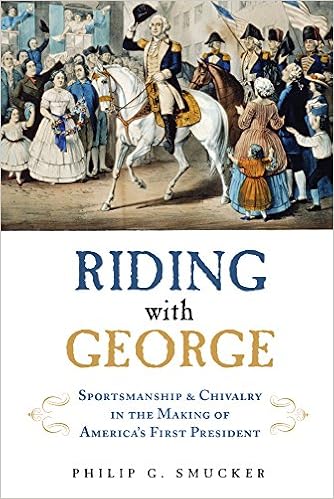
George Washington as soldier, aristocrat and excellent dancer
"Riding With George" gently confronts the marble, ossified immensity of the historical George Washington and strives to reveal the human side of America's most legendary figure. Author Philip G. Smucker's affable tour of the haunts of our first president succeeds rather well at this daunting task.
Contemporary publishing smiles on such odysseys through history, evidently hoping that modern references and a first-person narrative will overcome any dread of history instilled during rote memorization for school exams. Smucker, a journalist and a (very) distant relative of the great George, deftly sprinkles modern-day encounters through an often thoughtful consideration of who Washington actually was.
By emphasizing the social and recreational pastimes at which Washington excelled - notably, dancing and horsemanship (and its relative, fox-hunting) - the book connects those activities with Washington's astonishing career. In those public displays, Washington modestly yet unmistakably showcased his mastery and sheer physical grace, which reinforced his leadership as a general and a politician.
To hone his historical insights, Smucker turned to many experts, including a genealogist in Virginia's Westmoreland County, where Washington was born, archeologists at Washington's boyhood home in Fredericksburg and scholars at Virginia's restored colonial capital at Williamsburg.
The author also visited a re-enactment of the Battle of the Monongahela, where British Gen. Edward Braddock led some 1,300 soldiers (including Washington) into a brutal slaughter inflicted largely by Indian fighters. The episode reveals not only that there actually are French and Indian War re-enactments but also that they include such a notable debacle for the white intruders.
Not every attempt to connect the past to the present works out.
The book's title promises a horseback tour of Washington-related places, but the author was rarely mounted. Twenty-first-century land development patterns in the East offered no opportunity for intense horseback travel of the sort favored by Washington, who could cover 100 miles in two days.
So when Smucker couldn't hire a horse near the site of Washington's climactic Revolutionary War victory at Yorktown, he accommodated modern realities by hopping a Segway to roam the battlefield.
Smucker brings his own insights to Washington's story, connecting Mary Washington's apparent love of horses with her famous son's equestrian excellence, while shrewdly stressing the importance to his success of Washington's aristocratic neighbors, the Fairfax family. Through their invaluable sponsorship, plus their tutelage in the fine points of deportment, Washington hauled himself out of the third rank of Virginia landowners and into continental prominence.
Smucker even offers a sympathetic explanation of the young Washington's cringe-inducing report from his first battle that he found something "charming" in the sound of bullets whistling through the air.
That remark elicited perhaps the only surviving example of King George II's wit, when he commented that Washington would "not say so if he had been used to hearing many."
Based on his own experiences covering combat zones, Smucker defends his illustrious forebear's remark, insisting that the adrenaline rush of war can produce responses like Washington's. Indeed, the comment recalls the observation of another Virginia warrior, Robert E. Lee, that "it is good that war is so horrible, or we might grow to like it."
Smucker is not a slavish apologist. He acknowledges that the young Washington could be bumptious, unwise or disrespectful, and that there was an increasing gap at the end of Washington's life between his aristocratic ways and the emerging egalitarian manners of the American republic.
Yet, unlike some who undertake literary tours through historical landmarks, Smucker maintains an affectionate attitude toward his subject, not a mocking or ironic one. That attitude is all the more remarkable for a man whose parents sometimes chastised him to "start acting a little more like George Washington." Such remarks could have soured a person on George Washington for life.
Stewart is the author of "Madison's Gift: Five Partnerships That Built America" and "The Summer of 1787: The Men Who Invented the Constitution."
No comments:
Post a Comment